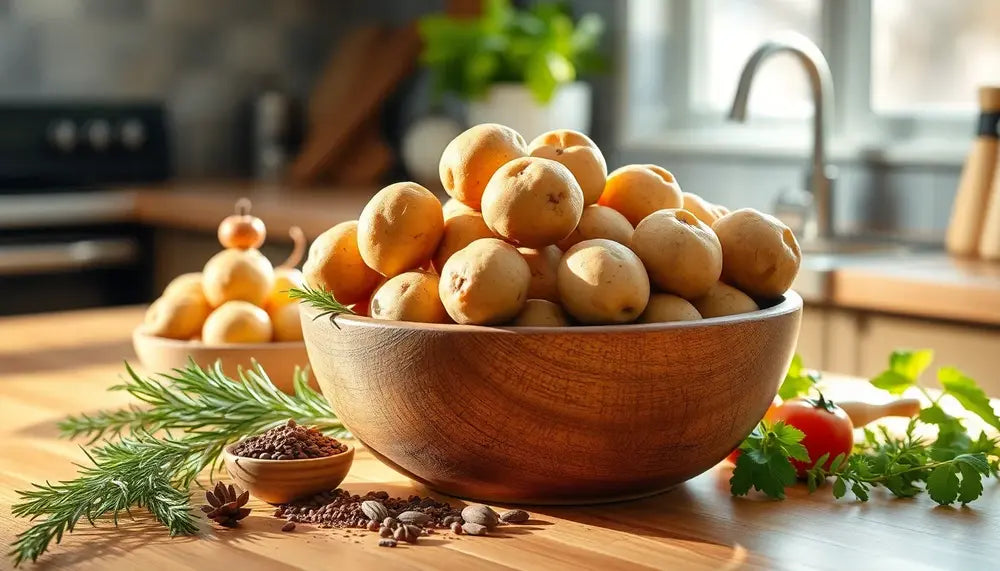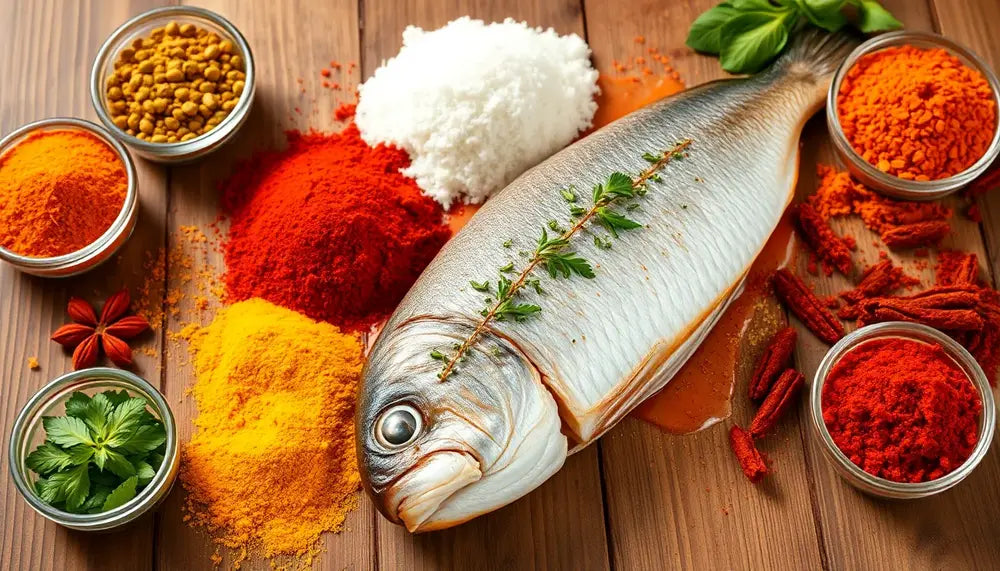Rosemary: An overview of the aromatic spice
Rosemary is a versatile herb valued in many cuisines for its distinctive spicy taste and aromatic scent. Originally from the Mediterranean region, it is now used in a wide variety of dishes around the world. The plant belongs to the mint family and is characterized by its needle-like leaves and blue-purple flowers. The intense essential oils make rosemary not only valuable in culinary terms, but also interesting for applications in aromatherapy and natural medicine.
The name rosemary comes from Latin, where "ros" means dew and "marinus" means sea, which roughly describes "dew of the sea". This name may refer to the natural habitat along the sea coasts where rosemary is commonly found. In the kitchen, the spice is valued for its ability to retain robust flavors over extended cooking times, making it ideal for braises and marinades.
But rosemary had and still has an important role not only in gastronomy, but also in cultural and historical contexts. In many cultures it symbolizes loyalty and memory and is therefore often used in ceremonies such as weddings and commemorations.
The diverse uses of rosemary in the kitchen
Rosemary can be used successfully in numerous culinary creations and gives them a distinctive Mediterranean touch. The areas of application are as diverse as the cuisines of the world.
- Meat dishes: Rosemary is particularly popular in preparing meat. It goes well with lamb, beef and poultry. The strong aroma of rosemary emphasizes the flavor of the meat and ensures a tasty crust when roasted.
- Marinades and dressings: Rosemary can be used fresh or dried in marinades and dressings. It combines well with oils and acids and intensifies the taste of salad dressings and marinades for grilled food.
- Potato and vegetable dishes: Vegetarian dishes can also be enhanced with rosemary. Potatoes and root vegetables in particular benefit from its flavor. A simple dish of oven-roasted potatoes with rosemary and olive oil becomes an aromatic delight.
- Soups and sauces: Adding rosemary during the cooking phase adds a deeper layer of flavor to soups and sauces. However, it should be used in doses as its intense aroma can quickly dominate.
- Baked goods: Surprisingly, rosemary is also used in the bakery. When combined with fruits or other herbs, it can enrich sweet dishes such as cakes or cookies.
These diverse uses make rosemary an indispensable ingredient in the kitchen for classic and innovative dishes alike.
Advantages and disadvantages of rosemary as a Mediterranean spice
| Advantages | Disadvantages |
|---|---|
| Enhances the flavor of meat, fish and vegetable dishes | Can be bitter if used excessively |
| Contains antioxidant properties that are beneficial to health | Not everyone likes the intense, resinous taste |
| Helps with digestion | May cause allergic reactions in people with specific intolerance |
| Can be used as a decorative element in the kitchen | The leaves are hard and can be a nuisance in some dishes if not chopped finely |
Health Benefits of Rosemary
Rosemary is not only a popular spice, but also offers numerous health benefitsthat have been scientifically examined. This aromatic herb is rich in important antioxidants and anti-inflammatory compounds, making it a valuable addition to the diet.
- Improve memory function: Studies show that rosemary essential oils can improve cognitive function, particularly short-term memory. Rosemary is therefore often used in folk medicine to promote brain performance.
- Supports digestion: Rosemary stimulates bile production, which aids digestion and can ease common digestive complaints such as bloating and cramps.
- Antioxidant properties: Rosemary contains high concentrations of antioxidant compounds such as rosmarinic acid and carnosol. These help protect the body from free radical damage and promote overall health.
- Anti-inflammatory effect: The compounds found in rosemary, including carnosic acid, have anti-inflammatory properties. They can help relieve symptoms of conditions such as arthritis.
- Promoting Hair Health: Rosemary oil is often used in hair care products because of its ability to promote hair growth and nourish the scalp. It can lead to thicker and healthier hair when used regularly.
The health benefits of rosemary are impressive and show that this herb is much more than just a spice. Its use in both culinary and medical contexts offers a variety of opportunities to promote well-being.
Tips for choosing and storing rosemary
Proper selection and storage of rosemary is crucial to preserving the full flavor and freshness of this herbal spice. Here are some useful tips to help you get the most out of your rosemary.
- Choosing Fresh Rosemary: When purchasing, look for fresh, strong needles that show no signs of wilting or browning. Fresh rosemary should have a strong, distinctive scent.
- Storing Fresh Rosemary: To store fresh rosemary, wrap the stems lightly in a damp kitchen towel and place them in a plastic bag or container. Store it in the refrigerator where it can stay fresh for up to two weeks.
- Drying Rosemary: Rosemary can be easily dried by hanging the branches in a dark and well-ventilated place. After the leaves are completely dry, they can be plucked from the stems and stored in an airtight container. This way the spice will last for several months.
- Storing Dried Rosemary: Store dried rosemary in an airtight container in a cool, dry place. Light and heat can affect the quality of the spice, so it is advisable to keep it away from these sources.
Following these tips for choosing and storing rosemary can help ensure your dishes are always enriched with the full flavor and aroma of this wonderful herbal spice.
How to properly use rosemary in the kitchen
Proper use of rosemary in the kitchen can enhance your dishes and give them a sophisticated Mediterranean touch. Here are some guidelines for getting the most out of this seasoning:
- Use whole branches: Whole sprigs of rosemary can be added to braises, soups, or stews while cooking. They are easy to remove before serving and release their aroma during the cooking process.
- Fresh vs. Dried: Fresh rosemary is particularly aromatic and is ideal for fresh preparation and garnish. Dried rosemary has a more intense flavor that goes well with long-cooked dishes.
- Dose amount: Rosemary has a strong aroma. Therefore, start with a small amount and add more depending on how intensely you want the dish to be flavored. A general rule is that one teaspoon of dried rosemary is equal in taste to one tablespoon of fresh rosemary.
- Crush with caution: If you want to mince fresh rosemary, use a sharp knife and chop the leaves finely to maximize the release of the flavors. Avoid grinding in a mortar as this can result in bitterness.
- Combination with other flavors: Rosemary combines well with other herbs and spices. It goes particularly well with thyme, sage and garlic as well as citrus aromas.
These tips will help you use rosemary effectively in your cooking creations and fully exploit the potential of this versatile spice.
Creative recipe ideas with rosemary
Rosemary not only brings a touch of Mediterranean flair to your kitchen, but also offers a variety of opportunities to get creative. Discover some exciting recipe ideas that highlight the characteristic aroma of this spice.
- Rosemary lemonade: Give your summer drink a flavorful twist by adding fresh rosemary sprigs to your homemade lemonade. Simply simmer water, freshly squeezed lemon juice, sugar and rosemary, cool and enjoy.
- Rosemary butter: Mix softened butter with finely chopped rosemary, a little salt and garlic for an aromatic herb butter that goes well with fresh bread or over steaks.
- Potato and rosemary pizza: Use thinly sliced potato slices, rosemary, mozzarella and a little sea salt for a simple but flavorful pizza. A pinch of freshly ground black pepper gives the dish the finishing touch.
- Rosemary Chocolate Cookies: Add finely chopped rosemary to your favorite chocolate chip cookie recipe. The tart note of rosemary forms an exciting contrast to the sweetness of chocolate.
- Fried fish with rosemary: Sprinkle fish fillets with finely chopped rosemary, a little lemon zest and garlic before pan-frying them. This gives the fish a wonderfully fresh and spicy aroma.
These creative recipe ideas with rosemary can be an inspiring addition to your culinary repertoire and show how versatile this spice really is.
Conclusion: Why rosemary should not be missing in any kitchen
Rosemary is a true all-rounder in the kitchen and beyond that should not be missing from any spice collection. Its versatility in various dishes and its health benefits clearly suggest that you should always have this spice on hand.
With its unique, powerful aroma, rosemary takes simple dishes to a new level and gives them a distinctive Mediterranean touch. Whether you use it fresh or dried, rosemary adds a flavorful depth to any dish, from meat to vegetables to desserts.
In addition, they are health benefits of rosemary should not be underestimated. With its antioxidant effect, it helps to strengthen the immune system and at the same time promotes general well-being. A simple sprig of rosemary can not only enrich your meals, but also have a positive impact on your health.
The ease of integration into everyday cooking, the possibility of long-term storage and the wide range of uses make rosemary a true treasure. It's no wonder this herb is valued in the kitchens of home cooks and professionals alike.
Let's summarize, rosemary has earned its place on every spice shelf - whether for culinary use or its positive effects on health. Its flexibility and benefits ensure that rosemary is becoming an indispensable ingredient in modern cuisine.
FAQ about rosemary: The aromatic Mediterranean spice in your kitchen
What makes rosemary a popular spice in Mediterranean cuisine?
Rosemary is known for its strong, slightly resinous aroma that pairs well with a variety of dishes, including meats, vegetables and even some desserts. It preserves and enhances flavors during cooking, especially in slow-cooked stews.
Can rosemary be used fresh and dried in the kitchen?
Yes, rosemary can be used both fresh and dried. Fresh rosemary has a more intense aroma and is particularly suitable for use in fresh dishes and as a garnish, while dried rosemary can be cooked for a long time and develops its aroma well in braised dishes and stews.
What health benefits does rosemary provide?
Rosemary is rich in antioxidant compounds that help protect the body from free radicals. It also has anti-inflammatory properties and can aid digestion and improve memory function and concentration.
How should rosemary be stored to preserve its freshness?
Fresh rosemary should be wrapped in a damp kitchen towel and stored in the refrigerator, where it can stay fresh for several weeks. Dried rosemary should be stored in an airtight container in a cool, dark place to preserve its aroma.
Which other spices combine well with rosemary?
Rosemary combines excellently with garlic, thyme, oregano and sage. These herbs share similar aromatic profiles and complement rosemary's strong flavors, especially in Mediterranean dishes.





Share:
Aromatic spices: enjoyment with the letter A
Storing spices correctly: Tips for optimal storage